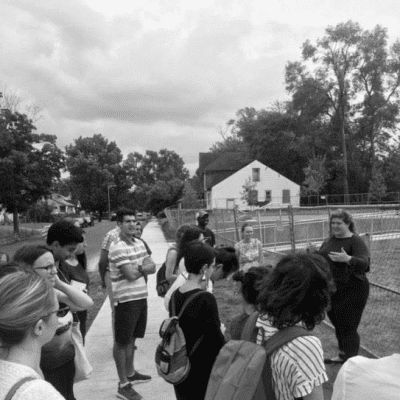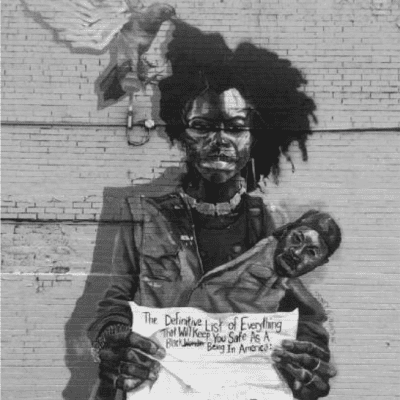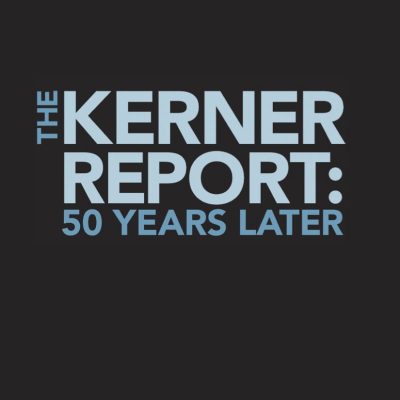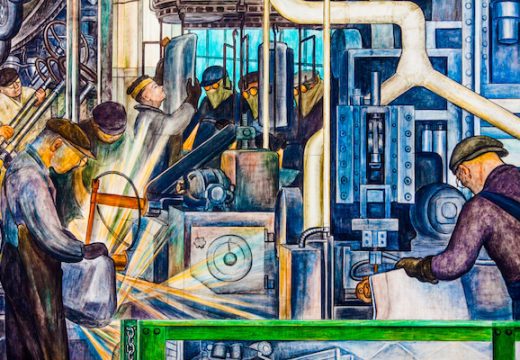Details
Article
The report on “Additional Issues” was produced as a part of the publication: The Kerner Report: 50 Years Later. This publication was released by the 2018 Humanity in Action Detroit Fellowship program.
This chapter discusses issues which were not addressed in the 1968 Kerner Commission Report yet are critical when examining inequalities and injustices in Detroit today.
Environment
Emma Yip
Within the city, the impact of environmental racism is seen more starkly.
Environmental justice in Detroit can’t be left out of the conversation when talking about its future. Detroit is home to the most polluted zip code in the state, 48217, in Southwest Detroit – home to predominantly low-income people of color. (1) Soil was found heavily contaminated with lead and arsenic, contributors to this pollution include 8 oil refineries, 3 factories that produce steel, 5 asphalt plants, and 1 hazardous waste collection site. (2) The city as a whole suffers from 29% higher asthma rates than the rest of Michigan. But within the city, the impact of environmental racism is seen more starkly: out of 10,000 black Detroiters, 49.3 were hospitalized for asthma related attacks, while only 29.6 out of 10,000 white Detroiters would be hospitalized for the same reason in 2013. (3) As the city continues to grow and heal since its bankruptcy, public officials must be held accountable for fostering job creation and industry building that does not poison minority families.
Transportation
Sharon Villagran & Mark Haidar
The importance of public transportation in Detroit cannot be overstated. Despite its legacy as a stronghold of the automotive industry, the struggle for expanding public transit has been an uphill climb. A defining moment of this struggle is the less than one-percent defeat of a Detroit Regional Transit Authority ballot proposal during the November 2016 election. The ballot proposal outlined a regional plan which would have connected residents across Southeast Michigan, specifically Wayne, Macomb, Oakland, and Washtenaw counties.
Transit is hardly an issue that functions in isolation.
In describing the failure of the proposal, many cite regional politics as a primary cause, with leadership in Oakland and Macomb as major players in blocking regional transit. Since then, transit activists have advocated for short-term improvements to existing systems, as well as plans to address long-term need throughout the city.
Transit is hardly an issue that functions in isolation. Transit activists have – time and again – raised concerns about access to jobs, public safety, over-policing, economic growth, and overall quality of life. As recent as this month, plans to include a new ballot proposal for the November 2018 general election were thwarted, as the RTA funding committee failed to come to the necessary 5-0 decision for it to make the public ballot.
The average premium in Detroit is nearly 400 percent higher than the national average.
Auto insurance is another key transportation issue in Detroit. While Michigan has higher auto insurance rates than any other state, Detroit has higher auto insurance rates than any other city nationwide. (4) The average premium in Detroit is nearly 400 percent higher than the national average. (5) Often, Detroiters pay more than $3,000 annually in car insurance alone. (6) These enormous costs can make car ownership prohibitively expensive and help explain how 25% of Detroit households do not have access to a car. (7)
This issue has received significant attention among candidates running to be Michigan governor, with all three Democratic candidates calling for an end to redlining. Redlining allows auto insurers to set rates based on factors other than one’s driving record (e.g. zip codes). In Detroit, a 139 square mile city that lacks efficient public transportation, it is absolutely critical that residents have access to a car. By reducing auto insurance rates, this will be more possible.
Newcomers, Gentrification and the Challenge of an Inclusive Future
Coline Constantin
In the aftermath of political, social and economic turmoil of the past decades, Detroit is once again becoming a hub for investors and entrepreneurs. This trend has both benefits and serious consequences for the city.
There are multiple effects of the investments and the increasing levels of outsiders’ money in Downtown and Midtown Detroit. While the immediate concern lies with the hiring of an overwhelming majority of newcomers, this influx directly affects all areas discussed in the previous chapters – education, employment, housing and policing, as well as transportation and entrepreneurship.
In light of these big changes, Detroiters have had mixed reactions. While some express their fear of an unwanted and imposed white gentrification excluding long standing communities, largely black Detroit communities, from this new prosperity, others see an opportunity for a diversified economy. How can a society fight for each member’s equitable share of the resources while overcoming the region’s racial and and socioeconomic divisions and tensions?
How could Detroiters hold newcomers accountable while being mindful of their opportunity to give them the benefit of the doubt? Should they?
In her poem Just Say Hi! (The Gentrification Blues), the Detroit writer Marsha Music discusses gentrification and the changing demographics of the city. (8) She acknowledges Detroit’s past and present, and emphasizes the importance of community and of recognizing its members. She does not decry the evident gentrification, but places it within the racial, social and economic context of Detroit.
But yes, I am a celebrant of signs of new development
And yes it’s true, that I’m in love with more new shops and shiny stores
and watches too, and lovely styles in newfound shops and peacock aisles
I just make sure I don’t forget, the ones who first did pay the debt
In order to move forward in a meaningful and inclusive way, outsiders bear the responsibility of acknowledging the racist and discriminatory past ingrained in the region and its present day legacy, as well as the privileges many of them carry in moving to Detroit and building lives, careers and businesses in the city. The newcomers cannot ignore their impact, visible or not, on communities. When working towards addressing this or any other issue of local interest, it is necessary that they involve these communities as equal partners in the decision- making process every step of the way.
Some would say that the inclusiveness of our society cannot be measured by the equitable sharing of our resources but by the equitable power relations between its members. In that sense, how could Detroiters hold newcomers accountable while being mindful of their opportunity to give them the benefit of the doubt? Should they? Moving toward living together in an inclusive and equitable society is probably not the most newsworthy narrative in the United States of America this present-day. What now remains to be addressed is how will Detroiters be able to balance decades of fights for their city and against its abandonment, while aiming for inclusivity and equitability
amongst all its members, old as well as new.
References
- https://www.pbs.org/video/southwest-detroit-pollution-w4mzd2/
- https://greatlakesenvironmentaljustice.wordpress.com/southwest-detroit/health- exposure/
- https://www.michigan.gov/documents/mdhhs/Detroit-AsthmaBurden_516668_7.pdf
- https://www.freep.com/story/news/local/michigan/detroit/2017/05/06/detroit-car- insurance-expensive-cost/101374948/
- https://abdulformichigan.com/autoinsurance
- https://www.freep.com/story/money/business/michigan/2014/11/23/detroit-auto- insurance-rates-premiums/19411987/
- http://www.governing.com/gov-data/car-ownership-numbers-of-vehicles-by-city-
map.html - Music, Marsha. “Just Say Hi! (The Gentrification Blues).” Marsha Music: A Grown Woman’s Tales from Detroit. April 11, 2017. Accessed August 01, 2018. https:// marshamusic.wordpress.com/just-say-hi-the-gentrification-blues/.
- Zimmer, Tyler. “Gentrification as Injustice: A Relational Egalitarian Approach to Urban Housing Markets” Public Affairs Quarterly. January, 2017.









